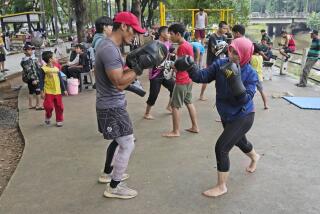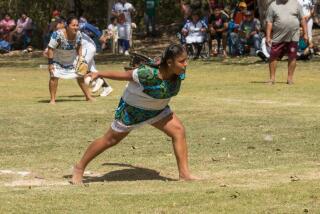10,000 Join Men to Battle Ethiopian Army : Women Soldiers Fight for Freedom and Equal Rights
- Share via
HESHKERBEB, Ethiopia — There is a local proverb that nicely sums up what used to be the attitude of Eritrean men toward women. It says, “Just as there is no donkey with horns, so there is no woman with brains.”
The culture that espoused this proverb forced most of its young girls to be circumcised at the age of 2. They were mutilated in a way that gave many of them chronic infections throughout their lives.
Eritrean women were forced into polygamous marriages, often at the age of 11. They were not allowed to go to school. They could not own or inherit property. Their husbands could divorce them at will. They were allowed no role in village politics. In factories in the Eritrean capital of Asmara, they were usually paid less than half the wages of men for the same work.
A proper Eritrean woman was expected to grind grain, prepare food, fetch water, gather firewood, tend the garden, clean the house, raise the children and keep quiet.
For the women’s liberation movement to infiltrate and revolutionize a culture such as this--as it clearly has in the last 15 years--there had to be a powerful engine of change.
There were two: civil war, and the willingness of Eritrean women to fight, kill and die in it.
“When a woman proved herself a successful fighter at the front, she could go back to her village with authority. Men had to listen to her. She could influence other women,” said Lel Ghebreab, chairman of the National Union of Eritrean Women.
Now, more than 30% of the fighters in the Eritrean People’s Liberation Front (EPLF), which has been fighting for independence from Ethiopia for more than 26 years, are women, according to Ghebreab.
They fight in trenches, go on guerrilla raids and fire heavy artillery. Ghebreab, 31, a former trench fighter, said one in three Eritrean casualties in the war is a woman.
Women began fighting in 1973. Almost immediately after they started shooting automatic weapons, Ghebreab said, they “began agitating and doing political work.” They took direct aim at the sexist culture that embraced Eritrea.
Four years later, women’s rights were incorporated into the constitution of the EPLF. The rights included “progressive marriage and family laws” and “full rights of equality with men in politics.”
The National Union of Eritrean Women was established as an arm of the rebel movement and was given the mandate to preside over what the revised constitution said should be a “social transformation.”
It was not pent-up anger over female circumcision or polygamy or lack of political rights that initially motivated Eritrean women to press for their rights, according to Ghebreab. Rather, she said, it was their helplessness against Ethiopian government soldiers.
“In Europe or North America, women are well fed, their children are safe. They demand such things as nuclear disarmament. For us, there are more immediate concerns,” she said.
“Most of us women went into the struggle because we faced atrocities. Women were living in caves, always afraid that the enemy would come and rape them, kill them and kill their children,” she said. “We agitated the men, asking them, ‘Is it better for us to die in the village or go out and fight?’ ”
For years, rebel leaders in Eritrea balked at allowing women into battle. The change came with new leadership in the rebel movement in the early 1970s, with continued pressure from women and with the war’s need for fighters at the front.
The first women fighters were given six months of preparatory physical and political training before they joined in infantry training with men. Since then, having proved themselves, women have settled into grim equality with men in a war that shows no signs of ending.
Letu Kidane, 26, has been fighting for six years. She is assigned to trench duty on a mountaintop near the town of Nakfa. Most nights she exchanges gunfire with male Ethiopian government soldiers who occupy a trench about 100 yards from that of the rebels. Two years ago, she was shot in the shoulder during an Ethiopian offensive. She was hospitalized briefly.
Kidane is married to an EPLF soldier of the same rank. Her husband, however, is assigned to a different unit. They are allowed to visit each other once or twice
a year. Like many female fighters, she has no children and has no immediate plans for any.
She acknowledged that her life is far different from that of her mother. But, while the war continues, she cannot envision doing anything but fighting, she said.
Women in the EPLF are barred from entering into a polygamous marriage and from allowing their daughters to be circumcised.
These female soldiers, estimated to number about 10,000, are the vanguard of the EPLF’s attempt to change the attitudes of women and men in rural Eritrea, Ghebreab said.
When the women go back to their villages, she said, they often have an enhanced status, enabling them to be elected to village assemblies and to command the respect of village chiefs.
A major goal of the National Union of Eritrean Women is to educate rural women about the health dangers of a radical kind of female circumcision common in the lowlands of Eritrea.
The procedure, called infibulation, surgically removes the clitoris, labia minora and inner walls of the labia majora and sutures up the two sides of the vulva. It causes complication in menstruation and childbirth and often leads to chronic infections. Infibulation traditionally is performed to prevent sexual intercourse.
Wukro Zerai, a researcher in women’s affairs for the EPLF’s Department of Public Administration, said the women’s union has tried to persuade Muslim women to use a ritualistic circumcision that will not cause lifelong mutilation.
“It is a slow process. Culturally, we cannot say we are against circumcision, only that we are against infibulation. We do not believe laws can stop it. We believe that only people’s consciousness can stop it,” Zerai said.
In 15 years, she said, awareness of the health dangers of the procedure has risen considerably. She said the topic, long considered inappropriate for public discussion, is now debated in village meetings in the predominantly Muslim lowlands.
The active participation of Eritrean women in a civil war is not unique in Africa. Women in Algeria and Zimbabwe took up arms and fought. But in those countries, after the fighting was over, the women were forced back into their traditional roles.
In Eritrea, Ghebreab said, women are determined not to let this happen. The best insurance against EPLF’s backtracking on women’s rights is education, she said.
Boys and girls in the EPLF school system, which claims to have 150 primary schools and 25,000 students, receive the same education.
“What makes us more confident is that we are not just changing our role in society,” Ghebreab said, “but we are changing the roles of the next generation.”
More to Read
Sign up for Essential California
The most important California stories and recommendations in your inbox every morning.
You may occasionally receive promotional content from the Los Angeles Times.













